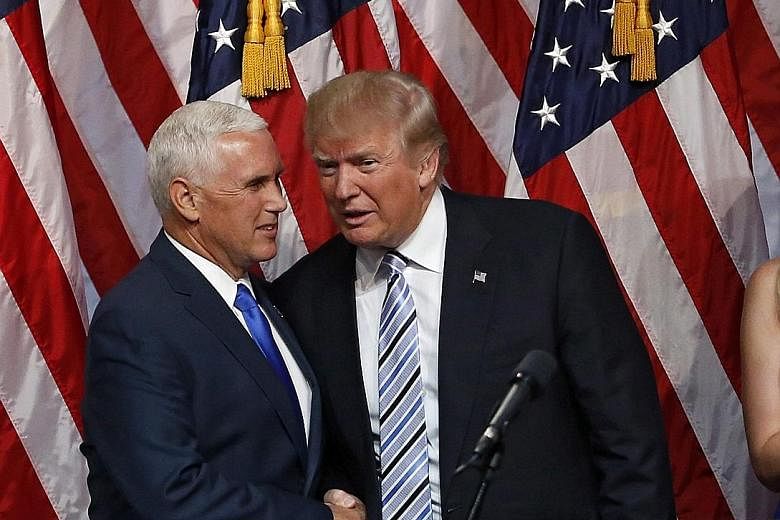NEW YORK • If ever there was a moment for Donald Trump to share the spotlight, his formal announcement of his running-mate should have been it.
Instead, his introduction of Governor Mike Pence of Indiana on Saturday was a remarkable reminder that, ultimately, the Trump campaign is about one person.
He called Mr Pence his "partner," but before the governor took the stage, Mr Trump stood alone and talked for 28 minutes, delivering a long and improvised riff that emulated his rallies instead of a traditional vice-presidential debut.
He talked about Mrs Hillary Clinton, terrorism, his primary victories, his crushing of a "Stop Trump" movement. He even got in a plug for his new hotel in Washington.
After about 20 minutes, he reached for his notes. "Back to Mike Pence!" he declared, turning to Mr Pence's record of job creation in Indiana. When he finally ceded the microphone to Mr Pence, rather than stand beside him while he delivered his remarks, Mr Trump patted him on the shoulder and walked off.
Vice-presidential rollouts are usually a carefully orchestrated high point of a presidential campaign, but Mr Trump's has been unusual and chaotic from the start.
Typically, the vice-presidential candidate is given a moment to shine. But Mr Trump spoke for more than twice as long as Mr Pence, whose speech lasted about 12 minutes.
The event, in a ballroom at a midtown Manhattan Hilton, had the feel of back-to-back news conferences lacking a recurring theme.
Mr Pence left most of the attack-dog role that is typical of a running mate to Mr Trump. Instead, he spoke humbly about a middle-class upbringing and his spirituality.
He also seemed more mindful than Mr Trump of the need to present a united front, a challenge given the fractured state of the Republican Party and the candidates' own considerable differences.
He sought to gloss over his previous criticism of Mr Trump's proposed ban on Muslim immigrants, choosing instead to criticise Mrs Clinton's call to take in more Syrian refugees. He did not speak in any depth about trade pacts, which he has supported in the past and which Mr Trump criticises.
In his choice of running-mate, Mr Trump moved to further shore up his support among Mid-Western whites. Passing over a throng of non-white Republicans recently elected to high office, he settled on Mr Pence, whose only demonstrated appeal is to conservative-leaning whites in the Rust Belt.
Republicans have wrestled for years with the push and pull of seeking to win over new groups of voters while tending to their white and conservative base.
Mr Trump's candidacy may force them into making a fateful choice: whether to fully embrace the Trump model and become a party of white identity politics, or to pursue a broader political coalition by repudiating his ideas - and many of the voters he has gathered behind his campaign.
NEW YORK TIMES

